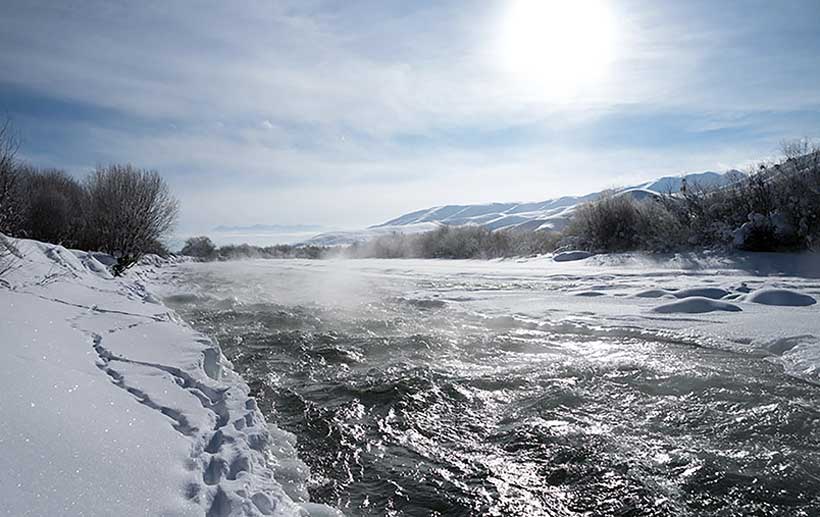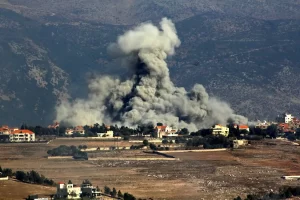“Will you turn it on, or not?” asked a woman in the Uzbek town of Chirchik, as she grabbed a grid electrician from behind and held a kitchen knife to his neck in an exchange captured on camera.
“If you are going to cut me, cut me,” responded the electrician, after power-starved residents descended on company premises for a control room showdown.
The incident in Chirchik, an hour outside the capital, Tashkent, that led to the 35-year-old woman’s arrest speaks to the desperation that has set in as parts of Central Asia clocked up their coldest cold snap in 15 years, triggering electricity, water, and heating failures.
While frontline workers have borne the brunt of the frustration, fingers are also being pointed at officials higher up the food chain, whose tendency is to hope for the best instead of planning for the worst when winter comes around.
Power outages are nothing new for most of the region’s population –villages across much of Central Asia lack electricity for all or most of the day during the coldest months.
When temperatures plunge, rural residents have to burn more coal, or, if they cannot afford it, dried dung. Residents of larger Central Asian cities tend to be spared the worst of systemic energy shortages.
This winter has been different, with residents of apartment blocks in Tashkent spending days without power, heating, and water, and residents of the Tajik capital Dushanbe also suffering badly.
“This is the first time they have completely failed in the capital,” said Temur Umarov, a fellow at the Carnegie Endowment for International Peace on Uzbekistan’s energy crisis.
“That is important because residents of the capitals have the closest connection to business and political elites. So it is precisely in the capitals where the image of these governments is being damaged,” Umarov said.
Temperatures have plummeted in Uzbekistan and other Central Asian nations in the past 10 days to below minus 30 degrees Celsius in some locations. Tashkent and Dushanbe, the Tajik capital, have regularly seen temperatures of minus 20 degrees or below during that period.
Massive Shortages
For many old enough to remember, this winter has been an unwelcome flashback to the winter of 2007-08, an event that still evokes shudders from those who experienced it.
Seemingly, nobody thought it could happen again.
But massive shortages in Uzbekistan’s gas supply became evident as early as November 2022, when the weather was also unseasonably cold, forcing the government to shut down gas filling stations and send gas-powered industrial assets into hibernation.
The shortages complicated life for a Dushanbe heating plant that has used gas from Uzbekistan to power its operations in recent years. Tajikistan’s grids have rarely benefited from an abundance of supply. Now the country is exporting electricity to Uzbekistan’s southern Surkhandarya region where shortages have been especially acute.
Saidmurod Murodov, a resident of one Dushanbe apartment block, complained that his apartment building has had heating problems for the last three or four years.
“We have children at home, everyone is sick. We called the heating network, and in response they said that it would be getting a little warmer soon, and so the buildings would be warmer,” Murodov told RFE/RL’s Tajik service.
“Why should we wait for it to be warmer outside to have heat in the buildings? If we need to, we will collect the signatures of 2,000-3,000 and appeal to the president.”
A representative of Dushanbe’s municipal water department meanwhile insisted that preparations for the winter season had been thorough.
“Nobody could anticipate that strong frosts would hit unexpectedly,” said the representative Mehrodjiddin Boborahimov in response to questions about pipes that had frozen, choking the water supply.
A Powerful Mayor Pays The Price
In Tashkent, Central Asia’s largest city with around 3 million people, residents have been seen cooking meals on open fires on the street, echoing scenes from early December 2002 in the city of Ekibastuz, Kazakhstan, where a power plant went offline for the best part of a week.
More than a fifth of the city’s neighborhoods have experienced extended shortages of electricity and power, according to officials.
The National Guard and the army have been put into action in the last week, helping to set up heated tents where people can warm themselves and drink tea.
Erstwhile Tashkent Mayor Jahongir Ortikhojaev’s attempt to get in on the act by offering out free bowls of pilaf proved too little too late, however.
On January 16, Uzbek President Shavkat Mirziyoev said that he had fired Ortikhojaev and several top-level energy officials including Deputy Energy Minister Sherzod Khodjaev over their failure to prepare the city for the winter.
Mirziyoev branded Ortikhojaev as “shameless” and accused him of “empty words.”
Ortikhojaev’s fall from grace is all the more striking since he has been one of the most prominent politicians of Mirziyoev’s reign, which began in 2016 after the death of the country’s first leader, Islam Karimov.
A wealthy businessman with little experience in politics, Ortikhojaev’s appointment back in 2018 was hailed by the president as investment-friendly.
Mirziyoev stuck by Ortikhojaev through scandals over property developments, which saw buildings in the city’s historic neighborhoods demolished, and a dispute in which Ortikhojaev appeared to threaten two journalists.
Nikita Makarenko, a well-known Tashkent blogger, argued in an interview with RFE/RL’s Uzbek Service that the building spree during Ortikhojaev’s tenure had played a role in Tashkent’s energy collapse, because “the infrastructure could not support [the new developments].”
Tashkent’s difficult winter was “the last straw” ending his mayoral reign, Makarenko said.
Another Tashkent-based journalist, Aleksei Volosevich, argued that the move was to head off a “protest mood,” which has emerged on the back of the shortages.
“He’s the right hand of Mirziyoev,” Volosevich said of Ortikhodjaev. “That says something. There is so much displeasure now that he had to do that.”
Unsung Heroes
If Ortikhodjaev and other officials are being held up as the villains of the regional cold snap, then its unsung heroes are people like Gulrukhsor Boeva, an orange-vested streetcleaner who works for Dushanbe’s municipality.
Earning around $120 per month her day begins in the earlier hours of the morning after a commute from Vahdat, a town outside the capital, where she lives with her children and husband, a former migrant worker in Russia who is currently unemployed.
“Of course it is hard, but what is to be done?” Boeva said as she took a break from batting snow down from roadside trees and shoveling it off the city’s sidewalks. “I am grateful for this work.”
Although the weather across the region has already begun to warm, sub-zero temperatures are expected to continue into next week.
The grid operator for Kyrgyzstan’s capital, Bishkek, on January 19 confirmed that parts of the city would see scheduled blackouts in the coming days to spare grid equipment from burning out amid growing consumption.
Turkmenistan, Central Asia’s most closed country and the holder of the world’s fourth-largest gas reserves, has also seen massive disruptions in its supplies of the fuel due to the cold, causing power outages.
Although the government has not officially acknowledged the problem, RFE/RL’s Turkmen Service received reports this week that private bakeries were among the buildings cut off as officials scrambled to improve the supply.
Source : Radio Free Europe






































